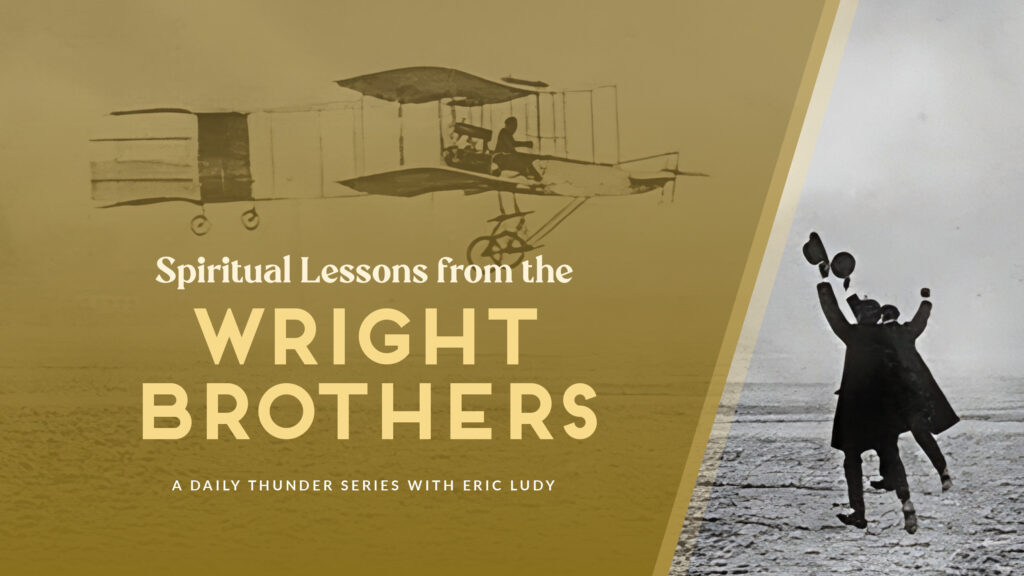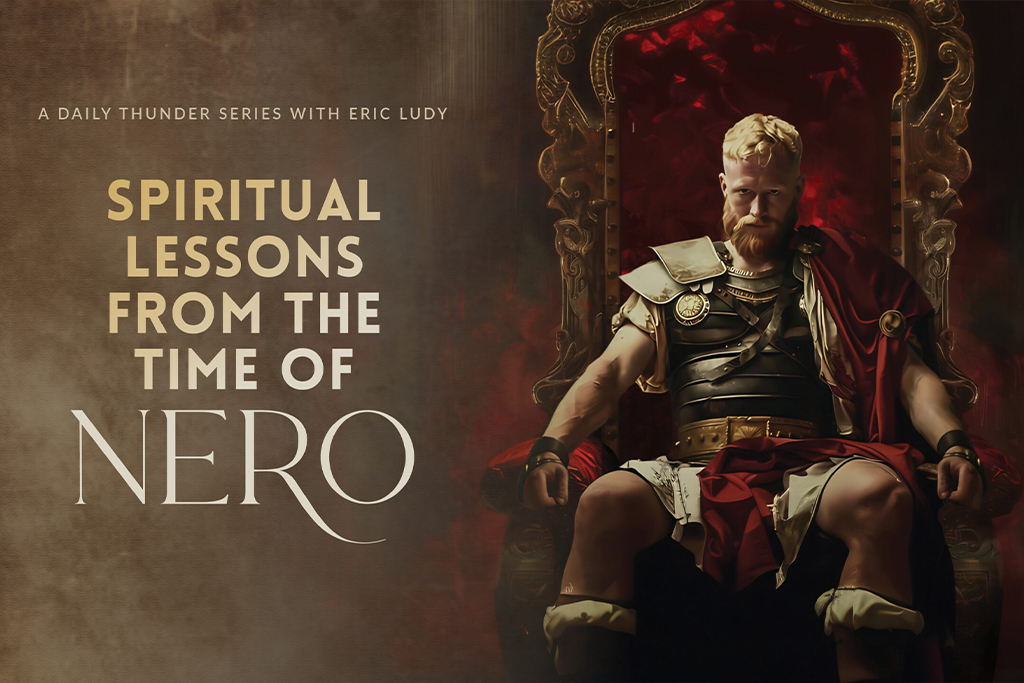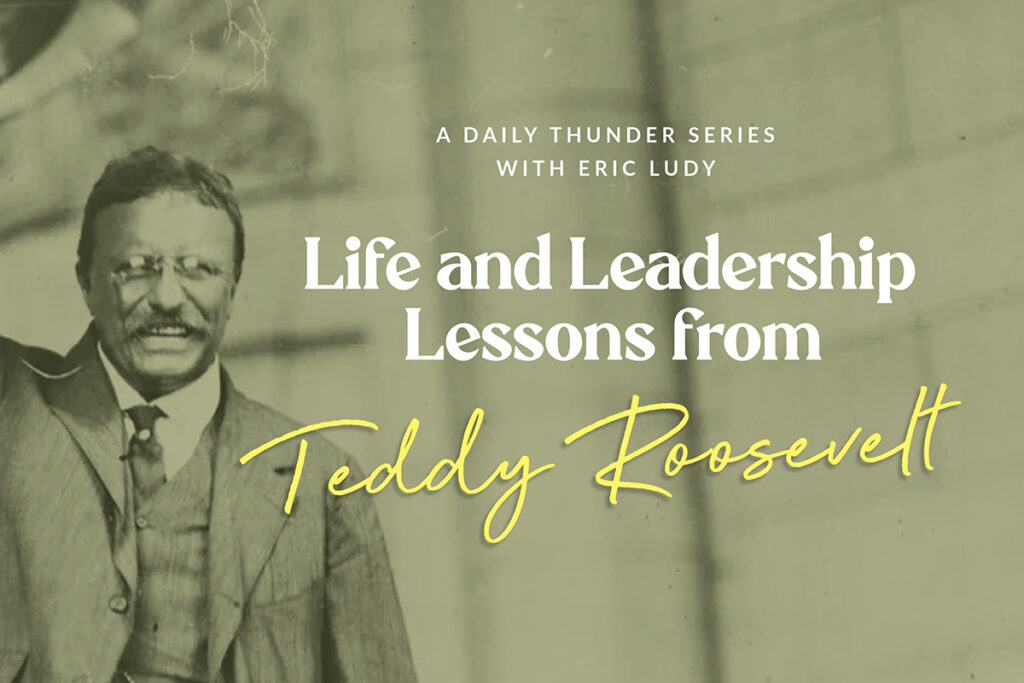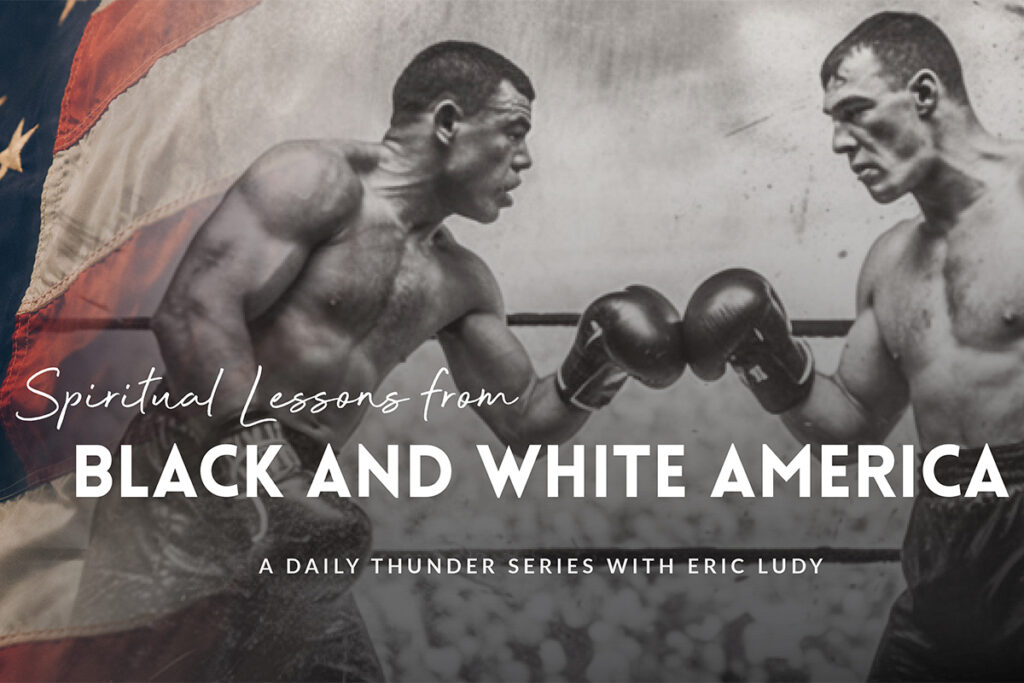A Daily Thunder Series with Eric Ludy
Spiritual Lessons from the Wright Brothers
Part 1: 7 Hawthorn Street
Very few men in history have impacted the course of history as did Wilbur and Orville Wright from Dayton, Ohio. They were every day men—simple men—but men with a childlike confidence that they could pull off an impossible task. There is a spark in every child—a spark that shouts, “Do something amazing!” But in 99.9% of children, that spark is dowsed by the cynical adults surrounding them. This is a message that invites each and every one of us to return to the age of six and start dreaming big again.
Part 2: Staring Down the Impossible
At the conclusion of the 19th century it was determined by the intellectual elite that human controlled flight would NEVER happen. In fact, it was officially declared to be “impossible.” Such was the challenging soil in which the Wright Brother’s miracle discovery of “human controlled flight” was fostered. Whereas, most human’s dream, dream, and dream only to ultimately succumb, and forsake their dreams, due to the counsel of the wise teachers of their age that declare their dreams to be inconceivable—there are a few men and women in history that haven’t stopped dreaming, even when the pressure to forsake their dream was laid on thick. The Wright Brothers are one of the rare ones in history that wouldn’t succumb, and instead, stared down The Impossible.
Part 3: The End of Orville Wright
In 1886 Orville Wright died . . . sort of. We don’t want to give away any spoilers, but the simple fact that Orville invented (with his brother, Wilbur) the first operational airplane in 1903, it maybe goes without saying that his death in 1886 must have been short lived. But so are all the deaths that we have along the way in our Christian life. Like Orville’s death in 1886, God will bring us to our end so that He can work a wonderful new beginning in us. This is what happened in Orville’s life. And this is what will certainly happen in our lives, too, if we will start appreciating the key role that death plays in the cultivation of abundant Life.
Part 4: What Every Wilbur Needs
It’s an interesting question to ponder—would Wilbur Wright have been able to invent the airplane without the help of Orville? Of course, it can’t be proved, but most would say, “No. Wilbur could have never pulled off the feat on his own!” For the mystery of controlled flight to be solved, Wilbur needed Orville and Orville needed Wilbur. The same is true in our spiritual lives. God designed us to do big things—impossible things. But to accomplish these big and impossible things, we need Orvilles in our life—people that challenge us, test us, and speak frankly into our souls. God can do amazing things when Wilbur’s humble themselves and actually listen to their Orvilles.
Part 5: The Wright Cycle Company
God designed mighty oak trees to grow out of small acorns. The same is true in our lives. Our small decisions in life are the acorns that form the basis of our growth, our direction, and our trajectory. The Wright Brothers laid the foundation of their lives in humble, hidden, hard work in a bicycle shop in Dayton, Ohio. This “acorn” grew up to be a mighty oak tree of impact in the world. God’s Kingdom pattern is just like this—take the little you have and invest it well—for if you are faithful with little, then God will entrust you with more.
Sermon mentioned in this episode: https://ellerslie.com/defining-moments-of-obedience/
Part 6: Bull Riding the Wind
In 1899 there were two diametrically-opposed approaches to solving the mystery of flight. The most common and popular view involved the absence of wind—it was believed that a total calm was necessary for flight. And the second involved embracing the wind—believing a gust of wind to be a benefit and not a hindrance to flight. Interestingly enough, these same two approaches exist today in Christianity. The most common and popular view today is that suffering, challenge, difficulty, and inconvenience must be avoided at all cost for an effective Christian life to be lived. And, course, there is the opposite view (which just happens to be the Biblical view) and that is that suffering, challenge, difficulty, and inconvenience—when embraced with joy—lead to the great triumph of Truth in this world. The Wright Brothers chose to bull ride the wind, and they changed history because of it.
Part 7: Living Inspired
Too many of us live life from task to task, from paycheck to paycheck, and from duty to duty, instead of taking in the wonder, the beauty, and the awe of living? Wilbur and Orville Wright specialized in drinking in the beauty of God’s creation about them—they were avid bird-watchers. And in learning to lift their heads out of their tasks, paychecks, and mundane duties—they saw things that no one else saw and had ideas that no one else had ever had.
Part 8: Kitty Hawk
As humans we have a proclivity towards the easiest route, the most comfortable way. We will purposely avoid difficulty, pain, and suffering and steer clear of inconvenience. And in so doing we are missing out on the best life has to offer us. For it is through these various trials that we exponentially grow and strengthen. These difficulties are our best friends and they work to build in us the necessary character, strength, and fortitude to change the world. Wilbur and Orville embraced this philosophy, packed up their belongings, and headed out to Kitty Hawk, NC. And there, amidst the immense wilderness difficulties, were fashioned into amazing men.
Part 9: The Power of the Fool
The Apostle Paul submits a challenge to the psyche of every believer when he describes the idea of becoming a “fool for Christ’s sake.” After all, the reason we as believers “believe” in Christ in the first place is because such an action is deemed the wisest and most reasonable conclusion to the dilemma of Sin and Death. So, to choose wisdom only to become a “fool” in the world’s eyes poses a unique psychological hurdle to the young believer. But, the path of Christ’s Fool is the path of power, it’s the path of profound impact. Wilbur and Orville Wright chose the Fool’s Path and changed the world because of it.
Part 10: The Dog Pile Technique
Our ancient enemy, the devil, has been around for the past 6,000 years working over the people of this earth with his devious tactics, schemes, and assaults. But, though we can readily admit that he is really good at his evil craft, we must remember that Satan was not just defeated 2,000 years ago at the Cross, but his methods of malevolence have been completely exposed in and through the Word of God. The Apostle Paul says, “We are not ignorant of the enemy’s devices.” In this study of the Wright Brothers, the devil’s tactics are powerfully exposed along with an accompanying lesson of how we are beautifully built by the Spirit of God to overcome all the his nefarious scheming maneuvers.
Part 11: Cowboy Bravado
The Church today is missing its cowboy bravado—it’s willingness to hop on the back of a bucking bull and ride it. Instead there is a passivity, a reticence, and a self-preservation that is controlling the actions of a high percentage of believers today. Wilbur and Orville Wright had cowboy bravado, and, as a result, learned to ride the bucking Wind—something all the experts believed was an impossibility in their day. For the strength of heaven to return to the Church, the cowboy bravado must once again return, too.
Part 12: The Diary of Derring-Do
The extraordinary work and discoveries of the Wright Brothers have changed the world over this past century. But one of their most understated achievements was the record they left behind them in both journal entries, drawings, and photography. Because of their record keeping, we are able to literally open a time capsule and smell the air they smelled and stick our toes in the sand that they traversed. Remembrance is a key function of the healthy Christian life. If we chronicled God’s working in our lives the way the Wright Brothers chronicled their discoveries, we would be Christian’s rich in faith.
Part 13: Sam Langley's Pride
The Wright Brothers were not dashing, debonaire men. They were not highly educated nor were they confident with the lady folk. They were simple men. And the adjective used to describe them more than any other was “humility.” The other leading aeronautical geniuses at the time were highly financed, highly educated, and highly snooty. Samuel Langley, the director of the Smithsonian Institute had one goal: to beat the Wright Brothers. Langley had everything needed for success. He had loads of money, loads of intelligence, and loads of scientific helpers. But, the one thing he lacked was humility. And that cost him everything.
Part 14: Sculpting the Sand Hills
When we think of the Wright Brothers, we think of two extraordinary men that pulled off an impossible feat all by their lonesome. And that is correct . . . sort of. There was actually a third person involved in this amazing accomplishment, but he is rarely ever discussed and, still to this day, is relatively unknown. His name was Charlie Taylor. It was Charlie that built the first plane engine. And without that miracle engine, human controlled flight simply would not have taken place. In the work of salvation, the Father and the Son get a good deal of our focus (as they deserve). But there is a Third Person involved in the saving of our souls that is mysteriously and purposely hidden in the process. And without this Third Person, we would all still be lost.
Part 15: Twelve Seconds
The Christian life is all about faith. But, what many Christians don’t realize is that it is not just the presence of faith that causes the Christian to triumph. It’s the testing of that faith; the proving of that faith as genuine that showcases the power of heavenly triumph. December 17, 1903 was a day of triumph. It was the first day of human controlled flight. And that triumph only lasted twelve short seconds. But those twelve seconds were the first twelve seconds of the trillion seconds of triumphant flight to follow. Often the first breakthrough in the living out of the Christian life is only a twelve second flight. But, let’s cherish our twelve seconds of impossible living and allow it to be the foundation of the eternity of triumph to follow.
Part 16: Overcoming the Three Day Stink
The Wright Brothers accomplished something on December 17, 1903 that changed the course of history. And yet, no one believed them. Their hometown of Dayton didn’t pull together a big parade to welcome the boys home from Kitty Hawk—no one was in a celebratory mood. In fact, one in every hundred Daytonians believed the brothers had actually accomplished what they said that they had accomplished. Moments like this are not uncommon in the landscape of the Christian experience. Often the very things we are laboring overtime to see accomplished in our life by the Holy Spirit are not understood, believed, or appreciated by those closest to us. What would the proper response to such strange indifference be?
Part 17: Huffman Prairie
Huffman Prairie represents a significant chapter in the Wright Brother’s story, but a “Huffman Prairie” chapter is certainly not unique to them. It’s a chapter that each of us must pass through. And how we pass through it defines whether or not we fulfill our high calling and actually fly.
Part 18: The Second Wind
In the Wright Brother’s story of flight, wind was an essential ingredient. First it was the natural winds of Kitty Hawk—they learned to master the gusting winds, gain lift, and soar. But, then, in 1904, they needed to figure out how to fly even when there wasn’t any wind. And this challenge proved to be an even greater problem. Like Wilbur and Orville, we, too, must learn to “fly” when the first winds fail. We must gain a second wind.
Part 19: The Big Announcement
The Wright Brother’s achieved flight on December 17, 1903 in Kitty Hawk, NC. The problem was, no one believed them. It wasn’t until nine months later (September 20, 1904), back in Dayton, Ohio that the brothers were able to demonstrate to the world that their Kitty Hawk claims of 1903 were actually true. But, outside their intimate team, there was only one witness there at Huffman Prairie on that day to actually behold the amazing feat. His name was Amos Root. Root was known as The Bee Man of Ohio. The Wright Brothers entrusted this humble eccentric man with the privilege of making the big announcement of their world-altering accomplishment to the world.
Part 20: Across the Pond
By 1905 the Wright Brothers had officially learned to fly. They had a testable and provable flying machine. But, even though human-controlled flight was a reality, less than 1% of Americans believed the accomplishment was real. The Wright Brothers spent the entire year of 1905 attempting to convince the American War Department that they had something important—something that would greatly benefit America. However, the American government shockingly rejected the invention. Meanwhile, the British and the French were more than enthusiastic to get their hands on this important tool.
Part 21: Unpurchasable
Rumor has it that everyone has a price. Supposedly, even the most virtuous man or woman, the most stouthearted, have their breaking point—the price point at which they are willing to compromise. However, those concocting such theories have never met Jesus Christ—a man who had no price and was totally and completely unpurchasable. This chapter in the Wright Brothers’ story tests them on this very theory. Will they compromise or will they stand firm. History will tell.
Part 22: A Pair of Shotguns
The Wright Brothers headed back to Kitty Hawk, NC in 1907 for the expressed purpose of getting alone and remembering afresh how to fly. They hadn’t flown for two and a half years and they had become a bit rusty in the art. How often we need the same thing in our spiritual lives—a return to wilderness, the desert, the solitude in order to rekindle the heavenly fires in the soul.
Part 23: The Bread and Cheese Moment
Wilbur and Orville, even after discovering human-controlled flight on December 17, 1903, still traversed difficulty after difficulty in convincing everyone that they did indeed accomplish the feat. From December 1903 to August 1908, the Wrights were accused of being liars instead of flyers. Each of our lives has a segment like this-a stretch of particular difficulties that define us either as failures or phenoms. But, following this challenging stretch, the much-anticipated breakthrough awaits us all—the day that all the hard work pays off. But right before this big day is the bread and cheese moment. And that is the biggest test of all.
Part 24: Triumph
After years of put-downs, ridicule, and mockery the day finally arrived for Wilbur and Orville Wright to show the world that they actually were flyers and not liars. In Le Mans, France on August 8, 1908, the stage was set for one of the most extraordinary public breakthroughs in history. There is an August 8, 1908 in every life that lives for Truth—when faith is made sight and the clouds roll back like a scroll. And, oh, is it a special day.
Part 25: Orville's Encore
In September 1908 all the pressure is on Orville Wright. In August, his older brother, Wilbur, amazed the world over in Le Mans, France, demonstrating the abilities of the Wright’s flying machine before a skeptical Europe. But now it’s Orville’s turn to show his stuff in front of skeptical America. On September 3, 1908 the pressure on Orville is nearly crushing. His task seems impossible. How can he somehow dazzle like Wilbur did in France? In many ways, we all experience this same unusual pressure when we realize that we are called to follow in the dazzling footsteps of Jesus Christ. Can it possibly be done?
Part 26: Tragedy unto Greater Triumph
September 17, 1908 tragedy struck. At Ft. Myers, in Washington D.C., Orville Wright had broken seven aeronautical world records over the previous two weeks. He was on top of the world. And then a grief intruded into the Wright Brother’s storyline. But, as in every good story, grief is never the final chapter, it’s merely a difficult stretch along the way which works as a catalyst for even a greater triumph in the end.
Part 27: The Tattered Flying Machine
The Wright Brothers built magnificent flying machines. Many of them were officially retired due to crashes in the early years of flight discovery. But there was one particular flyer that was not magnificent—it was tattered, ripped, re-stitched. It was built differently than all the others. Out of necessity, it was built out of broken and smashed pieces. And yet it was THIS tattered flying machine that was used to demonstrate to the world the miracle of flight. It sounds a bit like the Christian life, doesn’t it?
Part 28: The Homecoming
Throughout Christian history, the greatest longing of the believer has always been to go home to be with Jesus. As the Apostle Paul said, “to live is Christ, but to die is gain.” The world is unable to look at death as gain, but the Christian does. This message parallels the Homecoming welcome of the Wright brothers in Dayton, Ohio in 1909 with our future homecoming in Heaven. It’s a beautiful meditation that is sure to move and inspire.
Part 29: No Bird Soars in a Calm
This message puts the punctuation on the entire series. As the final episode, it brings the entire storyline in for a beautiful landing (pun intended). We follow Wilbur Wright to New York City and his final public flight. It is there that we are freshly stirred to remember that–since we never know when our last flight is going to be flown–we should fly every flight with all the gusto we possess, believing it may very well be our final one.










